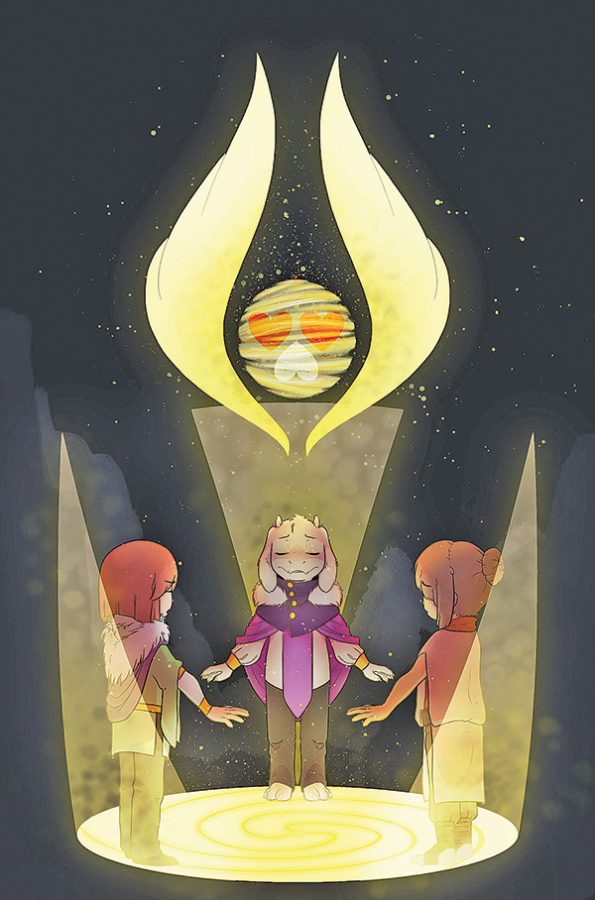“Deltarune”: journey to the dark world
Fans of indie video games got a surprise on Halloween as developer Toby Fox released the first chapter of “Deltarune,” a successor to his first game “Undertale.”
The release came only with a series of mysterious tweets on the “Undertale” Twitter account on Oct. 30th, promising a new announcement in 24 hours. The game is only a demo, but it feels like a completed game, even if it runs a little low in play time. It certainly heralds great things to come.
“Deltarune” follows the adventures of a school-aged human in a city occupied by monsters. They arrive late to class and get assigned a partner for a group project – a monster with a bad reputation named Susie.
The pair are asked to retrieve some chalk from the supply closet and from there, it gets interesting. They stumble into another world, called Dark World, filled with more interesting monsters who are inclined to fight the pair on order of their king, though they can be persuaded and befriended with the unique system of Act and Mercy, combat options that don’t do damage.
“Deltarune” mirrors its predecessor’s unique qualities by allowing players to not kill any of the monsters they face in the game, though unlike its predecessor, it does not seem to have the same story-changing aspects that made the choice feel so weighty. In fact, the game goes as far as to tell you that, “Hey, your choices won’t make a difference.” This feels like a bit of a downgrade when everything else is a major improvement from the overhauled combat to the atmosphere of the new world.
The humor is the strongest part of “Deltarune”. There wasn’t a period longer than five minutes when I wasn’t smiling or laughing out loud. The game is full of puns, quirky jokes and dialogue sections destined to become memes. Referential humor is also commonplace, but “Deltarune” does not overly rely on other media to make its punchlines. Instead the characters provide humor from simply being themselves.
Fox writes his characters with a careful sentimentality that endeared them to me quickly. From mean girl Susie to fluffy boy Ralsei, the characters are strong in personality and are memorable apart from the rather simple story. Where the story is a tad predictable, the character design shines through. The unique character design isn’t limited to just the main trio. Monsters that can be encountered include checker dogs and puzzle men.
The story feels like a typical portal fantasy game, hitting story beats that I’ve seen many times before, though there are very few games of this type. That said, its playful nature and rebalancing of relationships between some of the party members make it unique.
Still, the story is interesting and it leaves the player wanting to know far more than what is given to them in a normal playthrough. There is a deep sense of world that feels unknowable to the characters we follow.
How “Deltarune” fits alongside “Undertale” is difficult to decipher. Whether these are sequels is unclear, but two large clues point to them being connected. The first is instant, as “Deltarune” is an anagram for “Undertale.” The second clue is that the first non-player character player see is Toriel, the goat monster that was a fan favorite from “Undertale.” Many other characters from “Undertale” make their reappearances as the game continues.
The lack of concrete information isn’t frustrating, so much as it inspires fans to theorize and come up with their own ideas on how everything is connected or what the eponymous delta runes mean. It certainly makes it feel as if multiple playthroughs aren’t wasted. Each time, you’re most likely going to notice something new.
The soundtrack to “Deltarune” is inspiring. I find myself going back to the credit song often despite it only being 50 seconds long. It’s a song of promise and comfort, two emotions that Fox managed to lace throughout the entire 40 song album that runs through the demo. Musical motifs from “Undertale” make their appearance as well, used in a way that is nostalgic to those who played the previous game.
“Deltarune” runs about three hours, depending on how willing you are to search for secrets that have been so prevalent in Fox’s past games. Despite the short length, the game feels complete, save for one little scene at the very end that teases what is next.
“Deltarune” is a solid successor, and well-deserving of its spot next to “Undertale.” I am looking forward to what comes next in chapter two.










